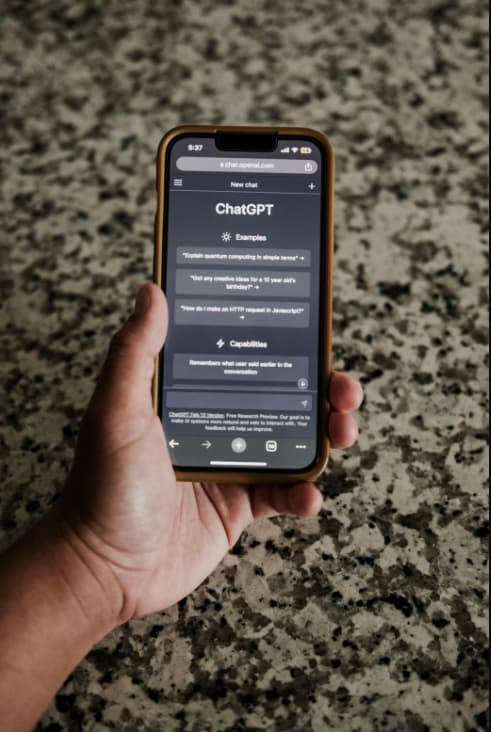Introduction
Modern technologies are increasingly penetrating the academic environment, becoming indispensable tools for students and researchers. Artificial intelligence (AI) has found widespread use, assisting in a range of tasks, including the preparation of academic papers, such as theses. However, it’s essential to understand how to utilize these technologies properly to ensure they serve as helpful assistants rather than sources of errors. In this article, we will explore how to effectively use AI, particularly ChatGPT, when working on diploma projects.
ChatGPT for Academic Writing
ChatGPT is an advanced AI language model developed by OpenAI, capable of generating human-like text based on the input it receives. With its deep learning capabilities, ChatGPT can help users with various writing tasks, ranging from content creation and summarization to brainstorming ideas. For academic writing, it can be a powerful tool to aid in drafting, organizing information, and even generating references. However, as with any technology, there are both benefits and limitations to using ChatGPT for academic purposes.
What ChatGPT can do for Academic Writing:
- Content Drafting: Provides coherent text structures for essays and reports.
- Summarization: Helps in condensing large pieces of academic material.
- Idea Generation: Supports brainstorming for research topics and thesis statements.
While these capabilities can provide support in academic writing, students should remain aware of its limitations.
The Cons of Using ChatGPT
Limited Critical Analysis Skills
One significant drawback of ChatGPT is its inability to perform deep critical analysis. Academic writing often requires nuanced interpretation and synthesis of ideas, which ChatGPT lacks the capacity to do effectively. It can process and reproduce existing information, but it cannot form original, critical arguments, a key component of high-level academic work.
Linguistic Errors and Unnatural Phrasing in German
While ChatGPT is trained in multiple languages, including German, it can still generate awkward or grammatically incorrect sentences, particularly when dealing with complex academic language. This may lead to errors in papers that require formal and precise communication. The use of AI-generated text in non-native languages may require significant post-editing to achieve clarity and fluency.
Information Distortion
Another downside is the potential for ChatGPT to distort facts or misunderstand the context of the information it is processing. Since it generates text based on patterns learned from vast datasets, the output can sometimes be inaccurate or misleading. This poses a risk for students relying on the tool for factual correctness in academic assignments.
Fabrication of Non-existent Sources
ChatGPT occasionally generates sources that don’t exist, which can cause significant problems when submitting academic work. Students need to manually verify every reference the AI provides to ensure it is real and accurate. Relying on fabricated sources can damage the credibility of the work and lead to penalties for academic misconduct.
Risk of Plagiarism
Although ChatGPT is capable of generating unique content, its reliance on existing data raises concerns about plagiarism. There’s always a risk that the generated content may resemble existing works too closely. Submitting AI-generated content without thorough originality checks can lead to unintentional plagiarism, putting students at risk of disciplinary action.
Lack of Originality
ChatGPT does not create ideas from scratch but works by recognizing patterns in pre-existing data. As a result, the content it generates lacks the originality and innovation required for academic papers. For high-level research projects, originality is crucial, and AI can hinder rather than help this process.
Use of Outdated Information
AI systems like ChatGPT are trained on data up until a certain point, meaning that they may provide outdated or irrelevant information, especially in rapidly evolving fields. Users need to be cautious when relying on ChatGPT for up-to-date research and cross-check the results with recent studies or articles.
For those seeking a more reliable and flexible solution for diploma thesis writing, ghostwriter for a diploma thesis services might be a better option, offering personalized and accurate academic support.
The Pros of Using ChatGPT

Accelerating the Research Process
One of the primary advantages of ChatGPT is its ability to accelerate the research process. By generating quick summaries of articles and presenting overviews of different topics, it can save students hours of preliminary research time. This allows students to focus on more critical parts of their paper, like data analysis and argument development.
Rewriting and Enhancing Text Originality
ChatGPT can help improve the originality of existing texts by rephrasing content to avoid direct duplication. This is particularly useful when paraphrasing is needed, ensuring that students meet originality standards without compromising on content quality.
Flexibility in Working with Various Topics
Due to its vast database, ChatGPT can generate content across a wide range of academic disciplines. Whether the subject is literature, science, or business, ChatGPT can assist in finding relevant materials and formulating basic content. This flexibility makes it a versatile tool for students from different fields.
Finding and Selecting Synonyms
When striving to improve the linguistic style of a paper, ChatGPT can help with synonym searches, ensuring that papers are not overly repetitive and that they maintain academic language standards. It can suggest alternative phrasing and words to enhance the overall readability of a text.
Automating Routine Tasks
ChatGPT excels in automating routine tasks that can otherwise consume valuable time. For instance, it can format bibliographies, generate lists of references, and produce standard document structures like tables of contents. This can be especially helpful when working on long academic documents like theses.
Translation and Adaptation of Foreign Sources
For students working with sources in foreign languages, ChatGPT can provide translations or adaptations, making it easier to integrate international research into their papers. This expands the breadth of material that students can include in their work, helping to make their papers more diverse and comprehensive.
Assisting in Data Analysis and Processing
While ChatGPT may not excel in deep analysis, it can assist in basic data interpretation. Students can use the tool to organize data, generate summaries, or perform initial analysis before diving into more complex statistical processes. This helps streamline the preparation phase of research projects.
Conclusion
ChatGPT offers a range of benefits for academic writing, from speeding up research to automating routine tasks and enhancing text originality. However, it also comes with limitations, particularly in its ability to perform critical analysis, avoid plagiarism, and ensure factual accuracy. Therefore, while ChatGPT can be a useful tool for students and researchers, it is essential to approach its use with caution, verifying the information it provides and supplementing AI-generated content with personal input.
For those who need more reliable and flexible support with their academic work, using ghostwriter services for a diploma thesis could provide a more tailored and accurate solution. As technologies like ChatGPT continue to evolve, they will likely play a growing role in academic writing, but human oversight remains indispensable for maintaining quality, originality, and ethical standards in academic research.
